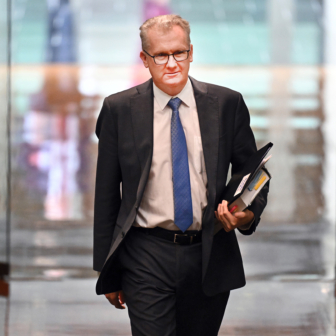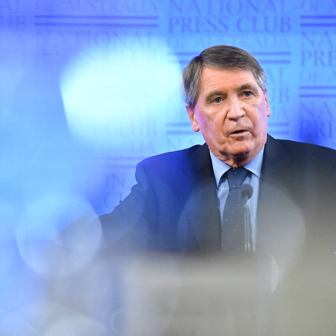Ideology is as old as politics. Political parties have always had shared attitudes. Historically, Labor believed that workers should get a higher share of profits and investors less. The Liberals believed that governments should focus more on ensuring that people were rewarded for their effort rather than on providing for everyone’s needs. The two parties put different weights on individual reward, individual choice and the universal provision of basic needs.
Political ideology was also driven by assumptions about what structures would deliver the best results. Labor believed that government delivery of services would solve the failures of the private sector to deliver. The Liberals believed that competition between service providers would deliver better services overall.
During the 1980s and 90s these ideologies broke down in many ways. People on all sides of politics realised that much of the time they weren’t disagreeing about which results were worth having. They were instead disagreeing about a factual question rather than a values question: which structures delivered the best results? Experience showed that well-designed competitive markets, with government regulations to protect the worst-off and prevent exploitation, delivered cheaper and better electricity services than a government monopoly. And so privatisation — well designed — was an idea that all sides of politics could back. Of course, that meant market design was vitally important, but that’s another story.
Today, a new kind of tribal belief is increasingly blocking policy reform, as we show in our recent Grattan report, Gridlock. These are tribal beliefs that some policy positions are simply right. Often these beliefs aren’t based on any consistent view about the importance of one value over another, or about what kind of regulatory structures work in practice. Rather, they’re often the result of history — political battles won or lost, sometimes many years ago.
For example, you won’t find a single Labor parliamentarian prepared to suggest (publicly at least) that changes to the rate or scope of the GST might be a good idea. It’s not a belief based on ensuring the needs of the worst-off are met. A well-designed GST reform package could deliver welfare changes and income tax reductions that would make people in the bottom 30 per cent of the income distribution much better off on average, an outcome Labor has traditionally sought. Having fought and lost two elections over a GST, though, it’s hard to move on.
Among the conservative wing of today’s federal Coalition, you won’t find anyone who thinks government should do anything about climate change. Some of them don’t think that carbon emissions are leading to global warming; some think global warming is a good thing that will increase rather than reduce prosperity; some think the costs of reducing emissions exceed the costs of living with a hotter world. Many believe all three. What unites those beliefs is not a value, or an observation about what kind of policy works best, but a commitment to a particular policy outcome.
To take another example, no serving federal Labor member has publicly acknowledged that there is any argument against increasing the superannuation guarantee from 9.5 to 12 per cent. I’m unaware of any of them having conceded in the past few years that an increase in that rate will lead to lower wages. No matter the conclusions of independent experts, backed by Treasury modelling, that a contribution rate of 9.5 per cent is already pushing the living standards of people on low wages lower than their incomes will be once they retire. No matter the conclusions of distinguished academics, the Reserve Bank and the Fair Work Commission (and many Labor MPs in the past) that increases in the super guarantee are an alternative to higher wages growth. And no matter that the major beneficiaries of increasing the rate will be the top 20 per cent of income earners, who will pay less tax over their lifetimes.
So if these beliefs aren’t about values — or what kind of government works best in practice — what are they about?
Their major function is to mark membership of a tribe. That’s why the need to conform to these beliefs is seen within a party as much greater than in the past. Simply holding the right belief marks you as “us” rather than “them.”
They are “shibboleths,” a word now at least 2500 years old. The book of Judges in the Old Testament tells the story of two warring tribes, one of which got stuck on the wrong side of a river. The other tribe, which controlled the river crossing, set as a password the Hebrew word for an ear of corn. They knew that people from the opposing tribe pronounced “shibboleth” differently. And so, in contemporary English, a shibboleth is a belief that marks membership of a tribe, rather than a consequence of rational thought or a particular value. Indeed, beliefs tend to make better tribal markers if they’re irrational. Otherwise there would be people who believe them because they think they’re true rather than because they identify with the tribe.
Having tribal markers is very important if the tribe looks after its own. If the leaders of the tribe are handing out government appointments, grants and contracts to their own members, they need a way of knowing who is “us” and who is “them.”
Shibboleths only work like this if there are penalties for not holding to the right belief. Another Coalition article of faith is that tax rates should never go up, particularly not taxes on investments. So when the Turnbull government announced that it would wind back generous tax concessions on superannuation, all hell broke loose — inside the party. The party’s broadsheet, the Australian, published article after article denouncing the changes. Major donors said they would never give again because the party had abandoned its “values.” The preselection of Kelly O’Dwyer, the responsible minister, was threatened.
Never mind that these changes were popular — particularly with those who had the most to lose, perhaps because they realised how indefensible the concessions were. Never mind that the proposals were consistent with the underlying policy purpose of superannuation. Never mind that the Coalition disproportionately won votes in the electorates most affected. A shibboleth had been questioned, and there had to be consequences.
Shibboleths are a big problem in politics precisely because they’re not rational. Almost by definition they lead to policy outcomes not based on the evidence. Over the past decade they’ve blocked progress on ten significant reforms recommended by Grattan Institute, particularly in three of the most important policy areas for Australia’s future prosperity: tax, superannuation and energy.
It’s a far cry from the golden years of reform in the 1980s and 90s, when the Hawke–Keating government jettisoned large quantities of party dogma to bring down tariff barriers, privatise industries and reform industrial relations.
So why are shibboleths dictating policy outcomes? Two forces are coming together: shifts in the electoral bases of our major parties; and the professionalisation of major parties so that they become almost arms of government rather than organisations that mediate between the population and government. Both trends are mirrored in other democracies around the world.
As Thomas Piketty and his colleagues have shown, the base of political parties is shifting. Traditionally, right-wing parties were aligned with business owners, high-income earners and people with high levels of education. But now people with high levels of education, including those with relatively high incomes, increasingly vote for left-wing parties. People with lower levels of education don’t belong to unions as much as in the past, now often work as sole traders, and are more likely to vote for right-wing parties.
Because the interests of their core constituencies are changing, policy issues are becoming more fluid within the parties. Issues that defined political parties for decades, such as government intervention in the economy and industrial relations, have converged on largely consensus positions. Social and identity issues such as marriage equality, workplace harassment, migration and racial disadvantage remain more contested. Many of these social issues cross traditional party lines. Bill Shorten has many policy views in common with Simon Birmingham, Joel Fitzgibbon has much in common with George Christensen, and it’s less obvious what policies they share with others in their respective parties. So instead, parties need shibboleths to mark who is a member of the tribe.
And tribal membership is increasingly important because of what political parties do. Politics has professionalised. Many more people have a career that starts as a political adviser, a union representative or an analyst at an aligned think tank and then progresses to preselection, parliament and the golden escalator to a lucrative government-relations role.
The professionals working for each party look after their tribe. Longstanding conventions are being trashed as government appointments to bodies such as the Administrative Appeals Tribunal and state government corporations increasingly favour those connected to the party in power rather than those best qualified. Government grants and contracts are often awarded to party donors, and those well connected — which may just be coincidence, but because the processes are increasingly opaque, who would know?
Patronage like this reinforces shibboleths. The rewards for toeing the party line are much higher. Breaking with the tribe can disqualify you from future patronage and jobs.
The disease is hard to cure. Politicians from all major parties have trashed valuable conventions that restrained politicisation of appointments, grants and contracts, and imposed consequences when politicians behaved badly. But there’s no going back. To restore good governance, these conventions will need to be replaced by hard rules policed by genuinely independent and well-armed regulators. The insider world of political advisers needs to be opened up to more people with policy expertise from the public service and fewer people with political expertise from student politics. Limiting political donations and campaign spending, and tightening controls on lobbying would also help to weaken the cosy coterie of politics and its clients.
Unfortunately the patient is not very interested in being cured. The current arrangements suit the major political parties and the professional political class very well. Although the treatments for the disease are well known, and voters strongly support them, the list of excuses for inactivity just gets longer.
History suggests that major institutional changes mostly happen only when there is an ongoing public scandal. Damning auditor-general reports aren’t enough. Only the nightly theatre of cross-examination at a royal commission or an independent corruption commission leads to voters focusing on institutional change rather than their usual concerns of jobs, health and education.
So the most likely path to change is for independent and minor-party members of parliament to insist on institutional reforms when they hold the balance of power. That’s how we got the Parliamentary Budget Office, the most significant institutional reform of the past fifteen years. And it’s an increasingly plausible scenario as the vote for minor parties and independents marches upwards, not least because voters are losing trust that the traditional parties are putting the public interest ahead of their own.
Shibboleths are a cancer eating away at good government. We need institutional change to weaken their tightening grip on our political class. Otherwise, many policy reforms that would benefit the country will continue to sit on the shelf. •
Gridlock is John Daley’s last report for Grattan Institute, where he was the CEO from its creation in 2009 to 2020.




